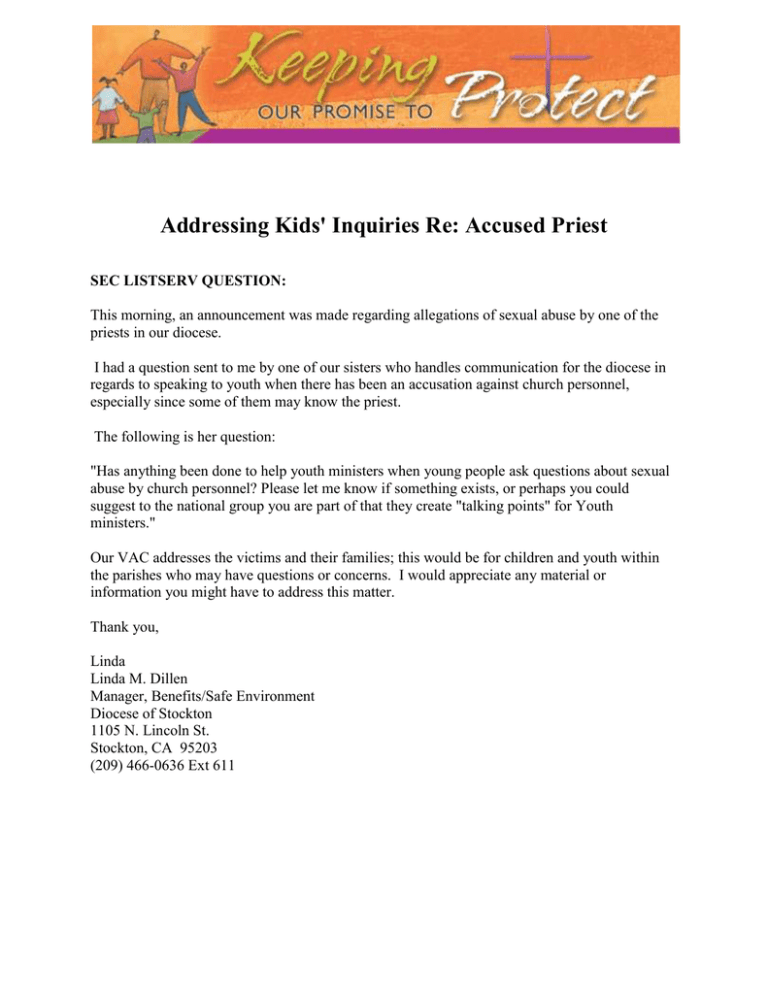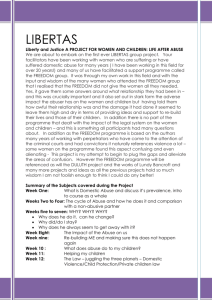Addressing Kids' Inquiries Re: Accused Priest
advertisement

Addressing Kids' Inquiries Re: Accused Priest SEC LISTSERV QUESTION: This morning, an announcement was made regarding allegations of sexual abuse by one of the priests in our diocese. I had a question sent to me by one of our sisters who handles communication for the diocese in regards to speaking to youth when there has been an accusation against church personnel, especially since some of them may know the priest. The following is her question: "Has anything been done to help youth ministers when young people ask questions about sexual abuse by church personnel? Please let me know if something exists, or perhaps you could suggest to the national group you are part of that they create "talking points" for Youth ministers." Our VAC addresses the victims and their families; this would be for children and youth within the parishes who may have questions or concerns. I would appreciate any material or information you might have to address this matter. Thank you, Linda Linda M. Dillen Manager, Benefits/Safe Environment Diocese of Stockton 1105 N. Lincoln St. Stockton, CA 95203 (209) 466-0636 Ext 611 _____________________________________________________________________________________________________________________ TABLE OF CONTENTS Cincinnati, OH St. Louis, MO Paterson, NJ St. Louis, MO Grand Island, NE Fresno, CA Fall River, MA Grand Island, NE Fall River, MA _____________________________________________________________________________________________________________________ Cincinnati, OH In some cases, we use one of the local psychologists who has particular expertise in the treatment of the sexual abuse of minors. Depending on the circumstances of the case, the psychologist meets with parents and children, teachers, and/or youth ministers and helps put together a response plan. We don't have a "one size fits all" but try to address each situation on its own merits. I would be careful about having youth ministers who have no training in responding to the sexual abuse of minors just having talking points. Youth ministers in the Archdiocese of Cincinnati have various levels of training and certification. Some are truly professionals who are paid; some are parents who are trying to help to the best of their abilities. For example, I'm a CPA by training. One of my priest classmates is a social worker by training. If I had to choose either him or me to speak with children about the sexual abuse of minors, I would choose him. Hope this helps. I'll keep you and those affected in my prayers. Fr. Joe Binzer in Cincinnati. St. Louis, MO I agree with Father Binzer completely. This is far too sensitive an issue to leave it to well-meaning but not well-trained individuals. Terry Paterson, NJ All: I am new to the world of Youth Protection, and just joined the Diocese of Paterson in NJ. I have, however, worked for many years addressing the issues of child abuse and domestic abuse. I agree with Father's point entirely. If you are not a trained and experienced professional in this domain, it is best not to provide any counseling. I would further suggest that you consider adopting the following model when dealing with these types of issues: Recognize: addressed. Be sure you are aware of the signs, the red flags, ect. That there is an issue to be Respond: Respond appropriately by acknowledging their concerns and showing your support. Refer: Either refer them directly or reach out to the professionals for help. This could be a trained profession/counselor in this area at the Diocese, a professional from one of the Catholic Charities agencies that may have expertise, the Employee Assistance Program (EAP) that some dioceses have, or one of the community Child advocacy agencies in your area. You might consider these the new 3-R's...no longer Reading, Rriting and Rithmatic ...but now Recognize, Respond, Refer. Dennis P. Butler, SPHR St. Louis, MO I agree with Fr. Binzer. When the Gospel says "Feed the Hungry" it doesn't give cooking instructions. If you need to know how to fix food, consult a cook. While some Youth Ministers may have the training and experience to deal with this, others clearly may not. Phil in St. Louis Grand Island, NE I am taking a little bit different read on your question. I am not sure that what your staff / volunteers are asking for is really a crash course in psychotherapy or crisis intervention. As a clinical psychologist, I agree with my colleagues that such interventions should be left to individuals who are specifically trained. If crisis intervention or psychotherapy is what you are seeking, please do seek the assistance of a trained professional. However, as I read your request I am hearing a request for how we can guide the adults who have real relationships with the children / youth in their parish in how to communicate with them at this time of crisis. I believe that communication is basic and essential to right relationships and that to keep children safe and to help our church (and our world) heal we need to do what we can to help every adult who is significant to a child model right relationships. That being said, this is my response: Discussing the topic of abusive relationships and removal of clergy from ministry (or other adults from their leadership role with children and youth) is a difficult topic. It would be so much easier to avoid discussion - to "sweep the issue under the rug," or pretend there was no issue - so the fact that your staff and volunteers recognize that communication needs to occur and are requesting guidance should be commended. I think that is wise to be prepared with some concrete examples that help guide significant adults in how to communicate about the issue in a way that is appropriate to their relationship with the child(ren) / youth (e.g. parent, teacher, minister, etc.). While we don't want to encourage our staff and volunteers to step out of their role and into the role of therapist, we must encourage them to respond in a way appropriate to their role. If we avoid our children's questions / concerns, or merely refer them to someone else, we give them the message that the subject is taboo and we undo much of what we are trying to accomplish to keep them safe. (Examples to get you started: A teacher may be encouraged to use children's inquiry as a teachable moment to review SE concepts and safety plans; a youth minister or spiritual advisor may respond with prayer; a parent may take the opportunity to remind their children how precious they are to them and how they will do all they can to help them be safe and loved and respected.) As far as talking points prepared at a national level, I think that there are some difficulties with such an approach. Rather than a universal set of talking points, the best approach would be for the adults to communicate with children / youth in the language that you are teaching them in their trainings. For example, in our diocese we begin our SE education with children / youth by discussing the "rules" for right relationships, signs that a relationship isn't right, and what to do if something isn't right. A youth minister or religious educator in our diocese might be encouraged to respond to inquiries from youth as a teachable moment to review our SE concepts: Do you remember when we talked / learned about the rules for right relationships? What are some of those rules? Does anyone remember what to do when you feel pressure to break the rules, or if you think a relationship isn't right? What is happening right now is that someone who was concerned did just what we asked them to do. They told an adult in the Church that something wasn't right, and the adults and the Church are doing what they can to figure out what happened and how to keep everyone safe. If you are concerned about what's happening tell a trusted adult. They will talk to you or find another adult who can help. Children don't need details about the abuse, that would be neither helpful nor appropriate; and inquiry or comments about the details of abuse can be redirected as we would any discussion that may be disturbing to others, resembles gossip, or violates another's right to privacy and respect. Children who persist in wanting to discuss details should be given an opportunity to talk with a professional and parents should be included in this referral. Staff and volunteers should be reminded to be observant of signs of distress in children / youth and make appropriate referrals. I firmly believe that we need to find a way for all adults who have significant relationships with children to respond and communicate regarding this issue or we will be facing the same struggles in the next 50 years that we have faced in the last. Elizabeth A. Heidt Kozisek, Ph.D. Fresno, CA Thank you so very much, Elizabeth. I think your response beautifully articulates and affirms all adult roles, and acknowledges that the specific circumstances and needs should be our guide to assess the best means of providing professional care. I agree that all adults must be prepared to respond according to their specific role and realize their limitations. Silence and avoidance can be so harmful. Teresa Fall River, MA I love your take on how to handle the situation and totally agree that it can and should be used as a teaching moment for children. However, I also know that children often overhear things, and as they get a little older, they not only hear gossip, but engage in it as well. I would also be concerned about how to preserve a child's faith if/when the word gets out that a priest has been accused of abuse. We all know how the earlier scandals impacted the faith of hundreds, so I believe that having some idea of how to respond to a child who is questioning his or her faith in light of such accusations would also be something we should consider. While there are no pat answers and certainly the questions will vary depending on the situation, we (leaders, parents, caretakers, etc.) should have some idea of what to say so that we are not struggling for answers if the situation arises out of the blue. Having met you and knowing your level of expertise and commitment, I'd love to hear your ideas on this piece of the puzzle. Debora Jones Grand Island, NE Thanks for the vote of confidence. It would be great to hear the wisdom from our collective group on this. Here's a few random thoughts to provoke thought and stir up dialog.... 1) It seems to be helpful to be able to differentiate our failings as human beings from our role in the Church. While we strive as leaders in the Church to follow Christ's example, as human beings we fall short. Every person who serves in the Church is just that - a person, and their actions don't always represent what God has in mind for us or what the Church teaches us. 2) Children, especially very young children tend to see things as very black and white. People are all good or all bad, something is all right or all wrong. Anything we can do in this situation to introduce the idea that we can have mixed feelings, good and bad qualities, exhibit positive and negative behavior can help them preserve their faith in spite of the negative behavior of someone they held as a model of faith. 3) Abuse, whether it occurs in a church setting, at the hands of a model of faith, or in a completely unrelated context; can impact children's spiritual development. Children may question, "If there is a God, why did this happen;" or conclude, "God must not love me to let this happen to me;" " I am not deserving of God's love;" etc. We can help preserve their faith by reinforcing the following: God's love for them is unconditional; God does not desire for them to be hurt; Pain and suffering are the result of human beings making bad choices with our free will; God does not desire for us to suffer, but will help us bring good from our suffering 4) The supportive response we give as Church - all our efforts to model right relationships and to be deliberately different from adults who may have harmed children- have tremendous power to overcome the actions of one abusive adult - even if that adult is a leader in the Church Beth Heidt Kozisek Fall River, MA Thank you for a very thoughtful response. I think those are excellent points to make and certainly good things for us to hold onto as a community, in the event that we (in any capacity) are helping a child who has experienced abuse or who hears about abuse by a member of the clergy. I have seen so many people over the years who did conclude that God must have abandoned them because bad things, such as abuse or violence, happened to them. I also agree that I would appreciate hearing other thoughts on this topic. I know that we are not VACs and I know that the first priority is to take care of a victim physically and emotionally, but spiritual healing is also a key component of the healing process and one that I find people are often the least prepared to facilitate. Many of us have or will be helping someone process abuse, whether in our roles in the church or in the larger community, and I think these discussions are very helpful. Debora Jones






